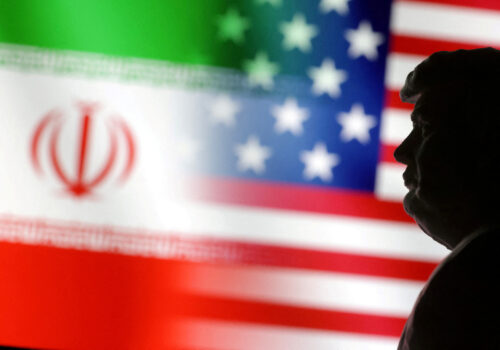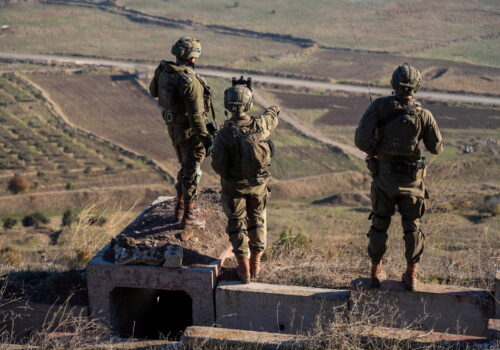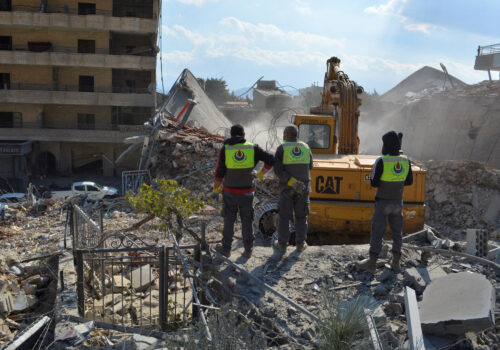Weakened by Israel, Hezbollah turns to spin games to hold support
In the aftermath of the collapse of the Israel-Hamas cease-fire in Gaza, fears of renewed fighting to Israel’s north sparked after it came under anonymous rocket fire from south Lebanon. Hezbollah, the Iran-backed militants in Lebanon, denied involvement and has neither restarted its attacks on Israel nor is it threatening to do so. In a far cry from the group’s late 2023 bellicosity, Hezbollah’s condemnation of Israel’s renewed “aggression” on the Gaza Strip implored the “United Nations, Security Council, and human rights organizations” to halt the renewed fighting through diplomatic and popular pressure.
The group’s more cautious posturing demonstrates Hezbollah knows it’s in no condition to fight.
This reality presents Hezbollah with a dilemma. Meaningfully responding to either Israel’s renewed military effort in Gaza or its continued attacks in Lebanon would invite war upon Lebanon again, mooting its quest for reconstruction aid and risking heightened Lebanese, and more critically Shia, dissatisfaction. But acquiescence, though it may currently be the more prudent choice for the group, also carries the risk of exposing its weakness and inability to confront the Israelis. This, too, risks siphoning Shia support.
To navigate this dilemma, Hezbollah is falling back on propaganda organs to spin its difficult situation positively.
Impact of war with Israel
During the year-long war, Israel decimated large parts of the group’s arsenal and wiped out its best military commanders and top political leadership. Both Bashar al-Assad’s downfall in Syria and US President Donald Trump’s rise in Washington have severely restricted Hezbollah’s paths to regeneration. Meanwhile, within Lebanon, the group must now contend with a population and politicians restive from an unnecessary war and calling for Hezbollah’s disarmament—rumblings that, if they spread into its Shia base, could threaten the group’s demise.
Squeezed as it is, Hezbollah is not currently aiming to rebuild enough strength to fight Israel nor to dominate Lebanon outright. Instead, the group is focused on the more achievable goal of navigating its current—largely self-imposed—predicament and surviving. Retaining its massive support among Lebanese Shias will prove critical to this objective, deterring any potential hostile moves by Hezbollah’s political opponents or the Lebanese government.
But retaining its supporters will depend on Hezbollah securing the reconstruction of the Shia community’s homes and properties destroyed in the recent war with Israel. The group will also need to demonstrate to its base that it maintains the ability to deter Israel and defeat it in battle—an image Hezbollah cultivated over decades and which acts as the basis of much of its popular support.
While both tasks will pose challenges for the group, the latter will be more difficult. Back in November, the Israelis forced Hezbollah to abandon its promise to continue attacking Israel until a cease-fire was achieved in the Gaza Strip, just two months after Hezbollah’s late Secretary-General Hassan Nasrallah had directly challenged Jerusalem to try to make his group back down. Hezbollah’s inaction as the fighting resumes in the Palestinian enclave undoubtedly highlights this capitulation—especially coupled with the group’s passivity while Israel’s air force continues to regularly target Hezbollah assets and kill its operatives and commanders with impunity throughout Lebanon.
Spinning the narrative: Hezobllah’s save-face
Hezbollah’s face-saving narrative rests, first and foremost, in its claim of victory over Israel in the recent war. This is based on three assertions.
The first assertion seeks to demonstrate that Hezbollah had to initiate attacks against Israel on October 8, 2023. The group thus claims it was preempting an imminent and unprovoked Israeli invasion of Lebanon. At once, this exonerates Hezbollah from provoking an unnecessary war with the Israelis over a foreign conflict amid near-total Lebanese economic collapse and paints Israel as the aggressor. Having thus positioned itself once again as Lebanon’s defender, the group’s narrative then heavily exaggerates both the odds confronting Hezbollah and Israel’s war goals—claiming the Israelis, with unlimited US and European backing, sought to utterly destroy Hezbollah, reach Beirut, and dominate Lebanon. Israel’s failure to achieve those goals is then taken as proof of the group’s success.
From there, Hezbollah claims its decision to agree to a unilateral cease-fire came “from a position of strength,” in Secretary-General Naim Qassem’s words—a concession to the requests of the Lebanese state, to spare the Lebanese people further suffering at the hands of the “murderous” Israelis, rather than caving to Israel’s military pressure. Qassem has thus repeatedly stressed that it was only natural for Hezbollah to accept the November 27, 2024, Lebanon-Israel cease-fire deal because it never sought to start a war.
“We opened a support front,” he said in a recent interview, “but support fronts don’t lead to war . . . that was an Israeli decision,” inverting the role of aggressor and victim.
SIGN UP FOR THIS WEEK IN THE MIDEAST NEWSLETTER
While that portion of Hezbollah’s narrative is meant to neatly package past events, the group has also developed an elaborate explanation for its persistent hold of fire despite continued Israeli operations. On Lebanon, the group insists it is motivated by the same sense of national responsibility that led it to accept the cease-fire deal, and not weakness. National responsibility, Hezbollah’s officials claim, now demands the group give diplomacy and the Lebanese State the chance to deal with the Israeli threat—while caveating with threats that its patience is not infinite.
As its inaction relates to the Palestinians, Hezbollah’s narrative has endlessly emphasized the group’s sacrifices to date on behalf of the “resistance” and the people in Gaza. During and after the war, the group stressed that its south Lebanon support front had bogged the Israel Defense Forces (IDF) down, slowing its advance in the Gaza Strip and blunting the worst impact of its war effort—even as Hezbollah somewhat contradictorily insisted that Israel was exterminating Gaza’s population.
In any case, Hezbollah insisted that agreeing to the November 27, 2024 cease-fire deal only meant the group would—in Qassem’s words—continue to “support Palestine in different forms” rather than stop altogether. Hezbollah did this in past years by arming and training militant groups such as Hamas and Palestinian Islamic Jihad operating inside Israel to carry out their own attacks or by facilitating operations against the Israelis by the Lebanon-based franchises of these groups. This allowed Hezbollah to maintain pressure on Israel, bleed out the IDF, and demonstrate its continued commitment to the Palestinian cause, while also maintaining enough plausible deniability to avoid proportionate Israeli retribution.
But now Hezbollah’s direct link to Palestinian groups in Israel has been cut off both by Assad’s downfall in Syria and the IDF’s continued occupation of five strategic points in south Lebanon. Meanwhile, unless diplomatic pressure can halt their strikes in Lebanon, the Israelis are set on aggressively enforcing new rules of engagement with Hezbollah that would deprive the group of its old ability to hide behind anonymous actors or third parties. In recent weeks alone, Israel responded forcefully to anonymous rocket fire from Hezbollah-controlled areas of south Lebanon and assassinated high-ranking Hezbollah commander Hassan Ali Badeer in Beirut on claims he helped Hamas plan a mass-casualty attack against Israelis abroad.
Despite these odds, Hezbollah still possesses the one advantage that has given its narratives traction in the past. The group, after all, is seeking to convince an audience that is half converted, in a broad sense, and half held captive by fear of the organization—rather than the buy-in of skeptics or open adversaries. But it is premature to rule on Hezbollah’s chances of success this time. Facts are, after all, unforgiving by their very nature. This time, the harsh reality—that Israel decisively defeated and critically weakened the group—may be too obvious and overwhelming for Hezbollah’s sophisticated propaganda organs to claim that the “Party of God” has once again emerged victorious.
David Daoud is a senior fellow at the Foundation for Defense of Democracies, focusing on Hezbollah, Israel, and Lebanon issues. Follow him on X: @DavidADaoud.
Further reading
Fri, Apr 11, 2025
The Iran nuclear talks are Trump’s decisive moment on military strikes
MENASource By Daniel B. Shapiro
Within a relatively short time, Donald Trump is likely to face the decision point on whether or not to pursue a military strike against Iran.
Tue, Apr 1, 2025
Israel is making a miscalculation in southern Syria. Here is why.
MENASource By Ömer Özkizilcik
Israel’s approach in southern Syria risks deepening sectarian divisions, eroding the Druze community’s standin, and fueling broader instability.
Tue, Mar 25, 2025
Dispatch from Bekaa: Inside the sectarian skirmishes on the Syria-Lebanon border
MENASource By Nicholas Blanford
Local Shia tribesmen have battled an assortment of Sunni jihadist militias and the new Syrian security forces dominated by Hayat Tahrir al-Sham (HTS).
Image: People gather next to a vehicle carrying the coffins of former Hezbollah leaders Hassan Nasrallah and Hashem Safieddine, who were killed in Israeli airstrikes last year, near the burial site of Hassan Nasrallah, on the outskirts of Beirut, Lebanon February 23, 2025. REUTERS/Mohamed Abd El Ghany TPX IMAGES OF THE DAY


